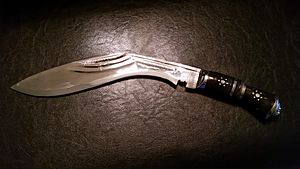Kukri facts for kids
Quick facts for kids Khukuri |
|
|---|---|

A polished kukri.
|
|
| Type | Machete |
| Place of origin | South Asia |
| Service history | |
| Used by | Gurkha |
| Wars |
|
| Production history | |
| Manufacturer | Gurkhas |
| Unit cost | $50–100 |
| Produced | 1810 |
| Specifications | |
| Mass | 450–900 grams |
| Length | 40–45 cm |
The kukri or khukuri (pronounced "koo-koo-ree") is a special knife from Nepal and India. It is mostly used by the Gurkha people. This knife has a unique blade that curves inward, a bit like a machete. People use the kukri for many things. It can be a helpful tool for daily tasks or a strong weapon.
You might see the name spelled in different ways, like kukri, khukri, or kukkri. These spellings often come from India. However, the original spelling in the Nepali language is khukuri.
Contents
What is a Kukri?
The kukri is a medium-length knife known for its curved blade. This special shape makes it very effective for chopping. It is heavier towards the tip, which helps with cutting power. The handle is usually made for a strong grip.
Design and Features
The kukri's design is very old and has been used for centuries.
- Blade: The blade is thick and strong, curving inwards. It is often made from high-quality steel.
- Handle: The handle is usually made from wood, bone, or metal. It is shaped to fit comfortably in the hand.
- Sheath: The kukri comes with a special cover called a sheath. This protects the blade and keeps it safe.
Small Companion Knives
Many kukris come with two small knives tucked into the sheath.
- Karda: This is a small utility knife. It is used for smaller tasks like skinning or opening things.
- Chakmak: This tool is used to sharpen the main kukri blade. It can also be used to start a fire by striking it against a special stone.
Who Uses the Kukri?
The kukri is most famous for being used by the Gurkhas. The Gurkhas are brave soldiers from Nepal. They have served in many armies around the world, including the British Army.
Gurkha Soldiers
The Gurkhas are known for their courage and skill in battle. The kukri is a symbol of their bravery and honor. Gurkha soldiers carry the kukri as part of their uniform. They use it for both combat and everyday survival tasks.
Kukri in Wars
The kukri has been used in many important wars throughout history.
- Anglo-Afghan War
- Sino-Nepalese War
- Nepalese–Tibetan War
- Battle of Nalapani
- First World War
- Second World War
- Falklands War
In these wars, the kukri proved to be a very effective weapon. It helped Gurkha soldiers in close-quarters combat.
Kukri as a Tool
Beyond its use in battle, the kukri is a very useful tool for daily life in Nepal.
- Chopping Wood: Its heavy blade is perfect for chopping firewood.
- Clearing Paths: People use it to clear bushes and tall grass.
- Farming: It helps with various farming tasks, like harvesting crops.
- Building: It can be used for cutting materials when building homes.
It is a versatile tool that helps people with many different jobs.
Images for kids
-
Kukri knife and scabbard on display at the Imperial War Museum North.
See also
 In Spanish: Kukri para niños
In Spanish: Kukri para niños







